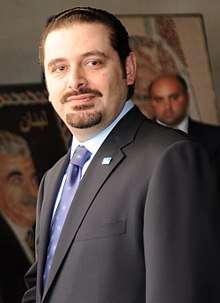Future Movement
Future Movement تيار المستقبل Tayyar Al-Mustaqbal | |
|---|---|
.gif) | |
| Chairperson | Saad Hariri |
| Founder | Saad Hariri and Nader El-Masri |
| Founded | 2007 |
| Headquarters | Beirut |
| Ideology |
Classical liberalism Economic liberalism Islamic democracy |
| Political position | Centre-right |
| National affiliation | March 14 Alliance |
| International affiliation | Liberal International |
| Regional affiliation | Arab Alliance for Freedom and Democracy |
| Colours | Blue |
| Parliament of Lebanon |
20 / 128 |
| Cabinet of Lebanon |
7 / 30 |
| Party flag | |
 | |
| Website | |
|
www | |
Future Movement (Arabic: تيار المستقبل, Tayyar Al-Mustaqbal) (FM) is Lebanese political movement, led by MP and Prime Minister Saad Hariri, the younger son of the assassinated former Prime Minister of Lebanon, Rafic Hariri.

The movement is the largest member of the March 14 Alliance, which won a majority of the seats in the 2009 parliamentary elections.
The Party was officially founded in August 2007, yet it was only declared on April 5, 2009 in a convention held at the BIEL convention center in Beirut. Like many Lebanese parties the Future Movement is officially secular, and the economically liberal Future Movement is predominantly supported by the Sunni Muslims of Lebanon.
After the killing of Ahmad Abdel-Wahid, the Future Movement called on Sunni Lebanese Prime Minister Najib Mikati to immediately resign, claiming his March 8 Alliance cabinet had shown incapability to maintain the country's internal security.[1]
The party is a full member of the Liberal International.[2]
Politics
The Future Movement was founded in 1992 and was part of the March 14 Alliance that includes, amongst many groups, the Christians associated with the Lebanese Forces and Kataeb parties (main 2 allies of FM). The majority of its base is made up of Sunni Muslims. The main opponent of Future Movement is the March 8 Alliance, most important parts being Free Patriotic Movement (FPM) led by General Michel Aoun and the Shia Hezbollah and Amal Movements.
Observers note that due to the lack in clear ideology and political vision, the movement often pursues sectarianism to mobilize its Sunni supporters.[3] This is demonstrated in its decision to have Mufti Rashi Qabbani lead a government meeting with a prayer as well as its increasing association with Sunni Islamist groups.[3] It is not clear if the Future Movement wants to build a Sunni militia because the Hariri family has favored the so-called checkbook diplomacy to obtain objectives and address political and even security issues.[3] The politics of the movement is viewed to have diverged away from Arab nationalism as an ideology in its push to maintain leadership in the Sunni community and to mobilize against the Syrian regime and the threat of Hezbollah.[4] Due to the nature of the movement as a coalition, it is often paralyzed on issues, with member groups such as the ultraconservative Salafis and the Sunni populists taking conflicting positions.[5]
Opposition to Hezbollah
In 2011, an official of the Future Movement warned that Shia Hezbollah "has all the characteristics of a terrorist party", and that Hezbollah is moving Lebanon toward the Iranian Shi'ite Islamic system of government.[6]
On 23 June 2013, Future Movement MP Nohad El Machnouk, who was appointed as the minister of interior and municipalities in Prime Minister Tamam Salam’s government on 15-2-2014,[7] told Murr TV that Lebanon is under occupation by Hezbollah.[8]
Media
The Future Movement has an important media presence in Lebanon and internationally. Media outlets expressing the Movement's views include Future Television, Future News, Radio Orient and Al Mustaqbal daily newspaper.
Future Youth
The Future Movement's youth wing, Future Youth, is a member of the International Federation of Liberal Youth (IFLRY), and hosted the 2009 IFLRY Executive conference in Beirut. Already in November 2010 they hosted another IFLRY-event, this time the General.
References
- ↑ Future bloc calls on premier to immediately resign NOW Lebanon, 22 May 2012
- ↑ Full Members Archived 2014-05-25 at the Wayback Machine., Liberal International.
- 1 2 3 Schwerna, Tobias (2010). Lebanon: A Model of Consociational Conflict. Frankfurt: Peter Lang. pp. 76–77. ISBN 9783631602478.
- ↑ Rabil, Robert (2014). Salafism in Lebanon: From Apoliticism to Transnational Jihadism. Washington, D.C.: Georgetown University Press. p. 238. ISBN 9781626161160.
- ↑ Knudsen, Are John; Gade, Tine (2017). Civil-Military Relations in Lebanon: Conflict, Cohesion and Confessionalism in a Divided Society. Cham: Palgrave Macmillan. p. 25. ISBN 9783319551661.
- ↑ Allouch: Hezbollah qualifies as a terrorist group. YaLibnan. 23 May 2011
- ↑ https://www.facebook.com/NouhadMachnouk/info?tab=page_info
- ↑ YouTube